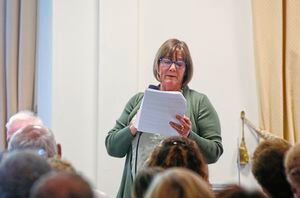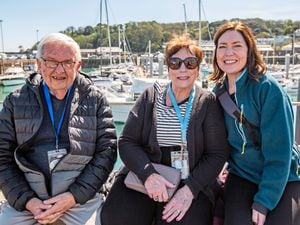Hundreds hear both sides of assisted dying debate
CAMPAIGNERS on both sides of the assisted dying debate outlined their reasons and answered islanders’ questions at a packed meeting at Les Cotils.

The evening was organised by Deputy Andrea Dudley-Owen and brought together speakers for and against the idea.
A requete led by Gavin St Pier, which calls for assisted dying to be introduced in principle in Guernsey, has generated much debate and will be voted on by the States at the meeting starting on 16 May.
Dr Richard Scheffer was a hospice medical director and consultant in palliative medicine in the UK for 20 years before retiring.
In his experience there were cases where no amount of care could relieve a patient’s suffering.
He said there were safeguards that could be put in place to protect vulnerable people and avoid the ‘slippery slope’ that some expressed fears about.
‘We are talking about real suffering and that cannot and should not be ignored because of potential risks that are not shown to happen elsewhere,’ he said, citing Oregon, where assisting dying was introduced more than two decades ago.
He said off-hand references to assisted dying as euthanasia or suicide were wide of the mark.
It was a decision made by terminally-ill people with the mental capacity to consider properly the information supplied to them.
‘That is not to say that it is an easy decision or that it comes without sadness, but it is for when the pain becomes unendurable.’
However, Robert Preston, director of think tank and research organisation Living and Dying Well, said a radical legislative change requires evidence that assisted dying would be safer and better for vulnerable people.
He did not believe any such evidence exists, which was supported by a member of the audience, who asked why assisted dying had been so rarely introduced in other jurisdictions if it had been such a success.
Mr Preston said that studies of Oregon showed that some people had gone through the process because of mental illnesses, such as clinical depression, anorexia nervosa and obsessive compulsive disorder.
Forty-one island churches, include representatives from the Church of England, Methodist and Catholic denominations, have formed a working party in opposition to the ‘dangers’ of assisted dying legislation.
However, Rabbi Jonathan Romain, a minister at Maidenhead Synagogue and founder of Inter-faith leaders for Dignity in Dying, argued that assisted dying was not at odds with his faith.
He saw no ideological or spiritual reasons as to why people ‘should have to live out their last days in misery’.
‘Why should other people be able to prevent you from making that choice about their life?
‘We still believe in the sanctity of life, that does not mean we believe in the sanctity of suffering.’
Dr Carol Davis, consultant in palliative medicine and clinical end-of-life care lead at University Hospital Southampton, emphasised the need to invest and expand specialist care services instead.
‘Palliative care restores hope and allows people to live as well as they can until they die and supports their families before and after their death.’
Members of the 200-strong audience raised issues on a wide range of subjects.
A medical professional who was practising at the time the Abortion Law was passed said she had felt pressurised into participating in procedures during staff shortages.
She had campaigned against it and felt her conscientious objection not to participate had not been honoured.
Dr Scheffer said conscientious objection was one of a number of safeguards that could and should be written into a new law.
A young woman said there were already staffing difficulties within health and social care which would be exacerbated by the introduction of assisted dying.
Others asked why they, or anyone else, should be denied the right to die at the time of their choosing.
Dr Scheffer said the absence of assisted dying legislation creates a situation where people instead contemplated suicide or having to ask a relative or doctor to be illegally complicit in the ending of their life.
This comes without any safeguards and causes further psychological stress and anxiety at an already difficult time, he said.
n A public meeting organised by Deputy St Pier on this subject is at 7pm on Thursday 10 May at Les Beaucamps High School.





